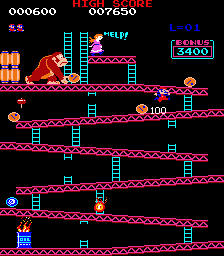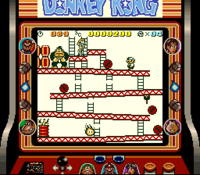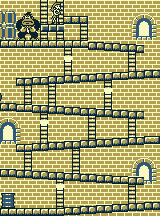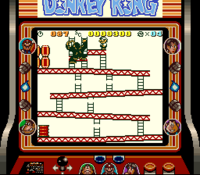25m: Difference between revisions
No edit summary Tag: Mobile edit |
LinkTheLefty (talk | contribs) No edit summary |
||
| Line 10: | Line 10: | ||
}} | }} | ||
[[File:Donkey Kong Super Game Boy Screen 2.png|thumb|left|25m in the Game Boy version]] | [[File:Donkey Kong Super Game Boy Screen 2.png|thumb|left|25m in the Game Boy version]] | ||
'''25m''' (or '''25 m''') is the first level of the ''[[Donkey Kong (game)|Donkey Kong]]'' arcade game and ''[[Donkey Kong (Game Boy)|Donkey Kong]]'' on the [[Game Boy]]. It is the bottom level of the [[Construction Site]]. The level starts with a cutscene of [[Donkey Kong]] bringing [[Pauline]] up to the top of the level. The player takes control of Mario as he [[jump]]s over [[barrel]]s and climbs to the top of 25m, where Donkey Kong and Pauline are located, via a series of [[ladder]]s. Mario also finds [[hammer]]s around the area, which he uses to smash the barrels. After reaching the top of 25m, Donkey Kong grabs Pauline and climbs up to [[50m]]. The bottom of the level also features an [[oil drum]]. If a blue barrel enters the oil drum, it creates a [[Fireball (Donkey Kong)|Fireball]] that tries to hunt down Mario. If there are five Fireballs simultaneously onscreen, Donkey Kong stops throwing blue barrels, and any remaining blue barrels do not create a Fireball unless Mario thins their number. | '''25m''' (or '''25 m'''), also called '''Stage 1'''<ref>Rocha, Garitt, and Nick von Esmarch. ''Playing With Power: Nintendo NES Classics''. Page 36.</ref> or '''Level 1''',<ref>Rocha, Garitt, and Nick von Esmarch. ''Playing With Power: Nintendo NES Classics''. Page 38.</ref> is the first level of the ''[[Donkey Kong (game)|Donkey Kong]]'' arcade game and ''[[Donkey Kong (Game Boy)|Donkey Kong]]'' on the [[Game Boy]]. It is the bottom level of the [[Construction Site]]. The level starts with a cutscene of [[Donkey Kong]] bringing [[Pauline]] up to the top of the level. The player takes control of Mario as he [[jump]]s over [[barrel]]s and climbs to the top of 25m, where Donkey Kong and Pauline are located, via a series of [[ladder]]s. Mario also finds [[hammer]]s around the area, which he uses to smash the barrels. After reaching the top of 25m, Donkey Kong grabs Pauline and climbs up to [[50m]]. The bottom of the level also features an [[oil drum]]. If a blue barrel enters the oil drum, it creates a [[Fireball (Donkey Kong)|Fireball]] that tries to hunt down Mario. If there are five Fireballs simultaneously onscreen, Donkey Kong stops throwing blue barrels, and any remaining blue barrels do not create a Fireball unless Mario thins their number. | ||
In the original arcade game, an intro segment shows Donkey Kong climbing to the top of the Construction Site with Pauline under his arm, then jumping along the top platform to cause the broken ladders and sloped girders that make up the level. It was cut, along with most of the cutscenes and the [[50m]] level, in the original [[Nintendo Entertainment System|NES]] version, but was eventually restored in the Game Boy version. | In the original arcade game, an intro segment shows Donkey Kong climbing to the top of the Construction Site with Pauline under his arm, then jumping along the top platform to cause the broken ladders and sloped girders that make up the level. It was cut, along with most of the cutscenes and the [[50m]] level, in the original [[Nintendo Entertainment System|NES]] version, but was eventually restored in the Game Boy version. | ||
| Line 16: | Line 16: | ||
In the Game Boy version, two layers of platforms are removed due to the handheld's small screen. A later level, [[Stage 9-5]] in the [[Tower (world)|Tower]], retains the exact appearance of the original 25m by employing a scrolling screen. | In the Game Boy version, two layers of platforms are removed due to the handheld's small screen. A later level, [[Stage 9-5]] in the [[Tower (world)|Tower]], retains the exact appearance of the original 25m by employing a scrolling screen. | ||
{{br|left}} | {{br|left}} | ||
==Enemies== | ==Enemies== | ||
{|class="wikitable" | {|class="wikitable" | ||
| Line 26: | Line 25: | ||
|Depends on how many blue barrels reach the oil drum. | |Depends on how many blue barrels reach the oil drum. | ||
|- | |- | ||
|[[File:DK Arcade Barrel Sprite.png]]<br> | |[[File:DK Arcade Barrel Sprite.png]]<br>Brown [[barrel]] | ||
|Varies | |Varies | ||
|- | |- | ||
|[[File:DK Arcade Blue Barrel.png]]<br>Blue [[ | |[[File:DK Arcade Blue Barrel.png]]<br>Blue [[barrel]] | ||
|Varies | |Varies | ||
|- | |- | ||
| Line 55: | Line 54: | ||
*A glitch found in the NES version and all but the final international arcade revision causes barrels to not roll down his ladder if Mario's hand is touching the top of the girder. | *A glitch found in the NES version and all but the final international arcade revision causes barrels to not roll down his ladder if Mario's hand is touching the top of the girder. | ||
==References== | |||
<references/> | |||
{{DK}} | {{DK}} | ||
[[Category:Cities]] | [[Category:Cities]] | ||
Revision as of 10:42, March 13, 2024
- "0-1" redirects here. For the board from Mario Party: Star Rush, see World 0-1.
| Level | |
|---|---|
| 25m | |
 25m in the arcade game | |
| Level code | Level 1 (arcade) Level 1 (NES) Stage 0-1 (Game Boy) |
| Game | Donkey Kong (arcade) (1981) Donkey Kong (Game Boy) (1994) |
| Boss | Donkey Kong |
| << Directory of levels >> | |
25m (or 25 m), also called Stage 1[1] or Level 1,[2] is the first level of the Donkey Kong arcade game and Donkey Kong on the Game Boy. It is the bottom level of the Construction Site. The level starts with a cutscene of Donkey Kong bringing Pauline up to the top of the level. The player takes control of Mario as he jumps over barrels and climbs to the top of 25m, where Donkey Kong and Pauline are located, via a series of ladders. Mario also finds hammers around the area, which he uses to smash the barrels. After reaching the top of 25m, Donkey Kong grabs Pauline and climbs up to 50m. The bottom of the level also features an oil drum. If a blue barrel enters the oil drum, it creates a Fireball that tries to hunt down Mario. If there are five Fireballs simultaneously onscreen, Donkey Kong stops throwing blue barrels, and any remaining blue barrels do not create a Fireball unless Mario thins their number.
In the original arcade game, an intro segment shows Donkey Kong climbing to the top of the Construction Site with Pauline under his arm, then jumping along the top platform to cause the broken ladders and sloped girders that make up the level. It was cut, along with most of the cutscenes and the 50m level, in the original NES version, but was eventually restored in the Game Boy version.
In the Game Boy version, two layers of platforms are removed due to the handheld's small screen. A later level, Stage 9-5 in the Tower, retains the exact appearance of the original 25m by employing a scrolling screen.
Enemies
| Name | Count |
|---|---|
Fireball |
Depends on how many blue barrels reach the oil drum. |
Brown barrel |
Varies |
Blue barrel |
Varies |
Donkey Kong |
Boss |
Appearances and references in other games
- In the Game Boy version, a later level, Stage 9-5 in the Tower, retains the exact appearance of the original 25m by employing a scrolling screen.
- On 75 m in Super Smash Bros. Brawl, Super Smash Bros. for Wii U and Super Smash Bros. Ultimate, the theme this level and the 75 m level share is one of the available songs. The theme is also heard in some fashion within all of the other Donkey Kong tracks available in Super Smash Bros. Brawl, as well as in the Donkey Kong and Donkey Kong Jr. medley in Super Smash Bros. Ultimate.
- This stage appears in the background near the start of Foggy Fumes in Donkey Kong Country Returns and its remake.
- In Nintendo Land, the end of the first level in Donkey Kong's Crash Course resembles 25m.
- In NES Remix, Link must play this level in one of the many challenges.
- A hand-drawn version of 25m appears in the PictoChat 2 stage in Super Smash Bros. for Nintendo 3DS as one of its drawings. The barrels Donkey Kong throws here can damage fighters.
- The Captain Toad: Treasure Tracker level Retro Ramp-Up is themed after 25m, with Spike and the spikeballs acting as stand-ins for Donkey Kong and the barrels. The musical theme for 25m is also incorporated into the level's song.
- In Super Mario Odyssey, the song "Jump Up, Super Star!" contains the musical theme for 25m during the point where "Odyssey, ya see" is repeated by the vocals. The bassist in New Donk City also can be heard playing the music when Mario first finds him. It can also be heard in the variation of "Break Free (Lead the Way)" heard during the ending cutscene.
- In the Mario + Rabbids Kingdom Battle DLC, Donkey Kong Adventure, at one point, one Rabbid throws barrels at another one in a wooden structure resembling this stage, and Beep-0's comment references the stage's name.
Trivia
- This is the only level in the game that does not feature Pauline's lost items.
- A glitch in the earliest arcade version allows Mario to complete the level by jumping from the first girder to the floor below which causes him to fall through the floor. This registers him as beating the level.
- A similar glitch can be found in the NES version. If Mario is positioned at a certain spot on the first fixed ladder, he could climb down and wraparound through the top of the screen to end up at the top girder.
- A glitch found in the NES version and all but the final international arcade revision causes barrels to not roll down his ladder if Mario's hand is touching the top of the girder.
References
| Donkey Kong | |
|---|---|
| Characters | Donkey Kong • Mario • Pauline |
| Levels | 25m • 50m • 75m • 100m |
| Items and objects | Bolt • Conveyor Belt • Hammer • Ladder • Lift • Parasol, Hat & Bag |
| Enemies and obstacles | Barrel • Cement tub • Fire • Fireball • Jack • Oil drum |
| Other | 25m Theme • Gallery • Media • Opening • Staff |


